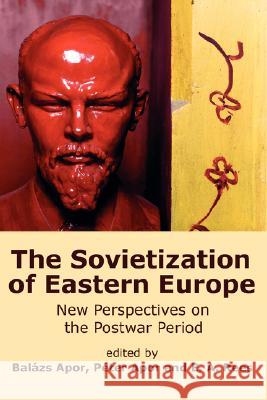The Sovietization of Eastern Europe: New Perspectives on the Postwar Period » książka
The Sovietization of Eastern Europe: New Perspectives on the Postwar Period
ISBN-13: 9780980081466 / Angielski / Miękka / 2008 / 364 str.
This collection of essays offers a captivating reading on how East-Central Europe was transformed into the 'Other' Europe. It is the first attempt to systematically explore the sovietization process in Central and Eastern Europe after the Second World War. Sovietization is generally understood in the book as a process with a dual dimension: it was in part an imperial project whereby the Soviet system was exported to the region, but it was also an attempt by the governments of the "people's democracies" to adopt a Soviet way of life (self-sovietization). Sovietization was a process dictated by ideological imperatives, but it also reflected the distinctive aspect of socialist strategies of state and nation building. Sovietization is examined in the book not only in terms of the imposition of new forms of government, but also in terms of the socialist response to modernity, as reflected in approaches to new technology and management, consumption and leisure patterns, religious and educational policy, political rituals and attitudes to the past. The essays contained in the volume explore the diversity and the tensions within the sovietization process in the countries of the region. "This collection is a bold and timely attempt at shedding light on a rather insufficiently researched topic. It offers a comprehensive view of the extent and consequences of the Sovietization process in the countries of East-Central Europe. Moreover, the diverse approaches-ranging from socio-cultural and economic history to psycho-history-offer to specialists and lay people alike a captivating reading on how East-Central Europe was transformed into the 'Other' Europe." - Dr. Dragos Petrescu, University of Bucharest. "This collection of essays remains attentive to the specificity of the ways in which Soviet socialist ideology and organizational structures, and Soviet-style practices, were embedded, naturalized, appropriated, transformed, subverted or repulsed in different national contexts in the nations of Central and Eastern Europe." - Dr. Susan E. Reid, Senior Lecturer, University of Sheffield. "After 1989, historical research on the Communist period usually remained within national borders. It is important to actively integrate the results of these endevors and pursue a European history of Communism. This volume is an important step in this direction. Its comparative, transnational perspective makes it an outstanding contribution to the field." - Prof. Dr. Christoph Klemann, Zentrum fur Zeithistorische, Potsdam.
This collection of essays offers a captivating reading on how East-Central Europe was transformed into the Other Europe. It is the first attempt to systematically explore the sovietization process in Central and Eastern Europe after the Second World War. Sovietization is generally understood in the book as a process with a dual dimension: it was in part an imperial project whereby the Soviet system was exported to the region, but it was also an attempt by the governments of the "peoples democracies" to adopt a Soviet way of life (self-sovietization). Sovietization was a process dictated by ideological imperatives, but it also reflected the distinctive aspect of socialist strategies of state and nation building. Sovietization is examined in the book not only in terms of the imposition of new forms of government, but also in terms of the socialist response to modernity, as reflected in approaches to new technology and management, consumption and leisure patterns, religious and educational policy, political rituals and attitudes to the past. The essays contained in the volume explore the diversity and the tensions within the sovietization process in the countries of the region."This collection is a bold and timely attempt at shedding light on a rather insufficiently researched topic. It offers a comprehensive view of the extent and consequences of the Sovietization process in the countries of East-Central Europe. Moreover, the diverse approaches-ranging from socio-cultural and economic history to psycho-history-offer to specialists and lay people alike a captivating reading on how East-Central Europe was transformed into the Other Europe."- Dr. Dragos Petrescu, University of Bucharest."This collection of essays remains attentive to the specificity of the ways in which Soviet socialist ideology and organizational structures, and Soviet-style practices, were embedded, naturalized, appropriated, transformed, subverted or repulsed in different national contexts in the nations of Central and Eastern Europe."- Dr. Susan E. Reid, Senior Lecturer, University of Sheffield."After 1989, historical research on the Communist period usually remained within national borders. It is important to actively integrate the results of these endevors and pursue a European history of Communism. This volume is an important step in this direction. Its comparative, transnational perspective makes it an outstanding contribution to the field."- Prof. Dr. Christoph Kleßmann, Zentrum für Zeithistorische, Potsdam.











